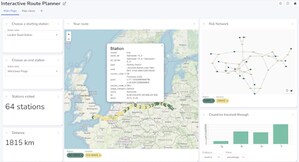First database query language to be certified since SQL in 1987, signifying the maturity and omnipresence of graph technology
SAN MATEO, Calif., April 17, 2024 /PRNewswire/ -- Neo4j®, the world's leading graph database and analytics company, is celebrating the publication of ISO and IEC's new international standard for graph query language (GQL), which defines the data structures and basic operations for working with property graphs. The new GQL standard follows the collaboration of Neo4j with fellow members of the ISO committee and recognizes the demand from customers for a standard graph language. This milestone speaks to the maturation of the graph database market as a whole and is a defining moment in the history of database innovation.
The ISO committee responsible for both GQL and SQL comprises vendors, researchers, and standards professionals from across the world, including Neo4j. The GQL standard is conceived as an ISO sibling to SQL and a close reflection of Cypher, often considered the de facto graph language. The standard consists of over 600 pages of formal definitions, references more than 400 papers, and is comparable in size and scope to the SQL-92 standard. SQL went on to become the dominant language for accessing relational databases, achieving mass worldwide adoption and dramatically accelerating the growth of the relational database market. GQL is now expected to have a similar impact.
Philip Rathle, Chief Technology Officer at Neo4j, said, "As our world becomes more and more connected, our data is also more and more connected. The best engine for operating in a connected world is a graph database. Likewise for analyzing and understanding business dynamics and the predictive role that connections can play. Graphs are supercharging digital transformation, analytics, and GenAI. With knowledge graphs as one of the high-impact Gen AI trends, ISO's timing for a Graph Query Language standard couldn't be more perfect!"
"The industry relies on open standards and open source to enable platform and tooling interoperability, developer and organizational choice. The generative AI movement has generally chosen to downplay the value of these building blocks, however," said James Governor, Principal Analyst and Co-Founder, RedMonk. "Given the rise of closed models and platforms, it's good to see some layers of the AI and data stack being standardized. ISO standardization of Graph Query Language (GCL) ensures that property graph handling will remain open as a de jure standard, similarly to SQL."
Tony Holland, Communications Lead, ISO/ IEC Joint Technical Committee 1/AG 1, said "These are exciting times for query languages, for standards development, for the Joint Technical Committee, and for the experts who have worked to develop this new standard. It marks a new chapter in the history of query languages, revolutionizing the way we interact with and harness the power of interconnected data. GQL represents a significant step forward in data querying and manipulation, offering a unified and expressive language for navigating complex graph structures. With a standardized framework for querying graph databases, GQL breaks down barriers to data interoperability and empowers developers, researchers, and businesses to unlock new insights, discover hidden connections, and create new innovations."
ISO has invested more than 5 years of work into this standard, with Neo4j involved from the start as committee members and technical advisors. To learn more about the GQL ISO standard, please visit:
- ISO GQL: A Defining Moment in the History of Database Innovation
- ISO/ IEC Information Technology Database Languages- GQL
- ISO-IEC Joint Technical Committee
- OpenCypher
- GQL Standard Community
About Neo4j
Neo4j, the Graph Database & Analytics leader, helps organizations find hidden relationships and patterns across billions of data connections deeply, easily, and quickly. Customers leverage the structure of their connected data to reveal new ways of solving their most pressing business problems, from fraud detection, customer 360, knowledge graphs, supply chain, personalization, IoT, network management, and more – even as their data grows. Neo4j's full graph stack delivers powerful native graph storage with native vector search capability, data science, advanced analytics, and visualization, with enterprise-grade security controls, scalable architecture, and ACID compliance. Neo4j's dynamic open-source community brings together over 250,000 developers, data scientists, and architects across hundreds of Fortune 500 companies, government agencies, and NGOs. Visit neo4j.com.
Contact:
pr@neo4j.com
neo4j.com/pr
©2024 Neo4j, Inc., Neo Technology®, Neo4j®, Cypher®, Neo4j Bloom™, Neo4j Graph Data Science Library™, Neo4j® Aura™, and Neo4j® AuraDB™ are registered trademarks or a trademark of Neo4j, Inc. All other marks are owned by their respective companies.
Logo - https://mma.prnewswire.com/media/2047144/Neo4j_logo_color_Logov1.jpg






Share this article